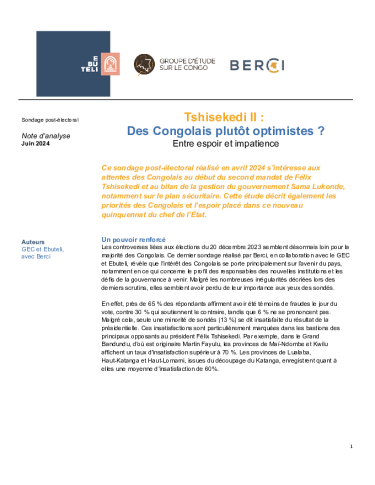Despite the worsening conflict in the east of the country and a precarious socio-economic situation, this new poll shows the relative optimism of the Congolese people. Nearly 50 percent of Congolese polled say they are satisfied with the direction the country has taken since the start of President Félix Tshisekedi’s second term, a figure comparable to 2019. This is one of the main findings of a nationwide telephone survey with a sample of 1,788 respondents carried out in April 2024 by the Bureau d’études, de recherche et de consulting international (Berci), with Ebuteli and New York University’s Congo Research Group (GEC).
The survey, entitled, “Tshisekedi II: des Congolais plutôt optimistes? Between hope and impatience,” also reveals that 46 percent of Congolese approve of the government’s management of the March 23 Movement (M23) crisis, despite the expansion of the rebellion, which has controlled several major towns such as Rutshuru Center and Kitshanga for several months.
Paradoxically, at a time when the humanitarian situation has worsened, with 7.1 million internally displaced people, those questioned seem to have a less pessimistic perception of the situation. Most government initiatives, even controversial ones such as the supply of arms to armed groups known as Wazalendo (“patriots,” in Swahili) and the return of the death penalty, are widely supported.
Furthermore, a majority of respondents are hostile to any negotiations with the M23: 63 percent are opposed, although this opposition has decreased since our previous poll in January 2023.
This poll also suggests a more positive perception of the Southern African Development Community (SAMIDRC) force than that of the East African Community (EACRF): 46 percent of those polled believe that SAMIDRC will lead to the eradication of armed groups. A much higher score than that obtained by the EACRF force previously (25%).
“Our survey shows a paradox: while the M23 crisis seems to be getting worse and worse, many Congolese unreservedly support the government’s policies. Political power seems to benefit from a kind of sacred union of public opinion in the face of conflict,” notes Pierre Boisselet, director of Ebuteli’s violence unit.
On the economic front, 63 percent of respondents expect their living conditions to improve during President Tshisekedi’s second term. Although challenges remain, such as late payments to civil servants and fuel shortages, economic growth has been maintained at 7.8 percent, and the national budget has tripled, exceeding the USD 10 billion mark for the first time. Among the urgent priorities for the second five-year term are the fight against corruption, job creation, and the fight against insecurity.
Read the full analysis note (French only).
